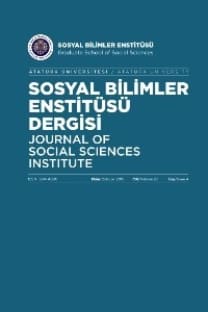Kurumsal İtibarın Bileşenleri ve Parametreleri Üzerine Deneysel Bir Çalışma: Türkiye'nin Öncü Kurumlarından Biri
Küreselleşmenin yaşandığı çağda, kurumların rekabet avantajı yakalayabilmelerinde yalnızca somut değerleri yeterli olmamakta, soyut değerleri ile kendilerini ifade etmeleri zorunluluk haline gelmektedir. Kurumların sahip oldukları en önemli soyut değerleri ise itibarlarıdır. Stratejik bir iletişim sürecinin ürünü olan itibar, tüm insanların kişi ya da kuruluşlar hakkındaki olumlu ya da olumsuz değer yargılarını ifade etmektedir. Bu çalışmada Türkiye'nin önde gelen kurumlarından birinin müşterileri özelinde Fombrun/Shanley'in kullandıkları itibar ölçeğinden yola çıkılarak itibar bileşenleri üzerinden anket tekniğiyle itibar ölçümlenmesi amaçlanmıştır.
An Experimental Study on Components and Parametres of CorporateReputation: One of The Pioneer Corporations of Turkey
In the age when globalization is experienced, it becomes necesssary for the corporations to express themselves not only with their concrete values which are insufficient for this purpose but also with their abstract values in order to get the competitive advantages. In this respect, the most important abstract values that corporations possess are their reputations. Reputation which is a product of a strategic communication process refers to the positive or negative value ideas of the people about a person or corporation. In this study, it is aimed to measure the reputation of one of the leading companies in Turkey from the point of their special customers. By means of a questionnare form using reputation components, the measurement was carried out through the reputation scale used by Fombrun/Shanley.
___
- Barnett, M. L., Jermier, J. M. ve Lafferty, B. A. (2006). Corporate Reputation: The Definitional Landscape. Corporate Reputation Review, 9 (1), 26–38.
- Baş, T. ( 2010). Anket, Seçkin Yayınları, Ankara.
- Bromley, D. B. (2002). Comparing Corporate Reputations: League Tables, Quotients, Benchmarks or Case Studies?. Corporate Reputation Review, 5 (1), 35-50.
- Corporate Communication Centre (2003). The Past-time Executive International Master of Corporate Communication Program, Erasmus Universiteit Rotterdam.
- Demir, F. Kurumsal İtibar Ölçümünde Kişiselleştirme Metaforu, Review of Social, Economic & Business Studies, Vol.9/10, 247-262. ( Erişim 23.09.2015).
- Er, G. (2008). Sanal Ortamda İtibar Yönetimi, Cinius Yayınları, İstanbul.
- Fombrun, C.J. (1996). Reputation: Realizing Value from the Corporate Image. Boston, USA: Harvard Business School Press.
- Fombrun, C.J. ve Van Riel, C.B.M. (2003). Fame and Fortune: How Successful Companies Build Winning Reputations. New Jersey, USA: Financial Times Prentice Hall.
- Geçikli, F. (2008), Halkla İlişkiler ve İletişim, Beta Yayınevi, İstanbul.
- Gotsi, M. ve Wilson, A. (2001). Corporate Reputation Management: Living The Brand. Management Decision, 39 (2), 99-120.
- Gümüş, M.-Öksüz, B. (2009). Turizm İşletmelerinde Kurumsal İtibar Yönetimi, Nobel Yayın Dağıtım, Ankara.
- H.B. Schultz ve A. Werner. Reputation Management, http://www.oxford.co.za/download_files/cws/Reputation.pdf (Erişim Tarihi: 07.12.2015).
- Hermann, S. P. (2008). Stakeholder Based Measuring and Management of CSR and Its Impact on Corporate Reputation. M. Huber ve S. O’Gorman (Ed.) içinde, From Customer Retention to a Holistic Stakeholder Management System: Living a Vision (s. 51-62). Berlin, Germany: Springer.
- Kadıbeşegil, S. (2006). İtibar Yönetimi. Mediacat Yayınları, İstanbul.
- Karaköse, T. (2007), Kurumların DNA’sı ve İtibar Yönetimi, Nobel Yayın Dağıtım, Ankara.
- Karatepe, S. (2008), İtibar Yönetimi: Halkla İlişkilerde Güven Yaratma, Elektronik Sosyal Bilimler Dergisi, 7(23).
- M. Page, C. (1998). Understanding Corporation Reputation: A Public Relations Perspective, Ottowa University.
- Peltekoğlu, F. (2007), Halkla İlişkiler Nedir?, Beta Yayınları, İstanbul.
- Şakar, N. (2011), Kurumsal İtibar ve Paradigmalar, Beta Yayınevi, İstanbul.
- Nakra, P. (2000). Corporate Reputation Management: "CRM" with a Strategic Twist?. Public Relations Quarterly, 45 (2), 35-42.
- Schwaiger, M. (2004), Components and Parameters of Corporate Reputation- An Emprical Study, Schmalenbach Business Review, Vol.56.
- Sipahi, B.- Yurtkoru, S.- Çinko M. (2008). Sosyal Bilimlerde SPSS' le Veri Analizi, Beta Basım Yayım Dağıtım A.Ş. / İşletme - Ekonomi Dizisi, İstanbul.
- Uzunoğlu, E.- Öksüz, B. (2008), Kurumsal İtibar Riski Yönetimi: Halkla İlişkilerin Rolü, Selçuk İletişim Dergisi, 5(3).
- http://dictionary.cambridge.org (Erişim 25.09.2015).
- http://www.tdk.gov.tr ( Erişim 23.09.2015).
- ISSN: 1304-4990
- Yayın Aralığı: Yılda 4 Sayı
- Yayıncı: Atatürk Üniversitesi Sosyal Bilimler Enstitüsü Müdürlüğü
Sayıdaki Diğer Makaleler
İjlal Ocak, Nil Duban, Gülhan Yağıcı
İyi Oluş Fenomeninin Bilişsel Boyutunun Yapılandırılması:Olumlu Yönelimler Modeli
Başaran GENÇDOĞAN, Özkan ÇİKRIKCİ
Hüseyin Aslantaş, Barış Demirci
Çağdaş Felsefe Öncesi Düşüncede Akıl - İlerleme İlişkisi
Türkiye'de Yazılı Basının Laiklik Kavramına Bakışı
Büyük Selçuklular ve Irak Selçukluları Döneminde Dîvân-ı İşrâf
